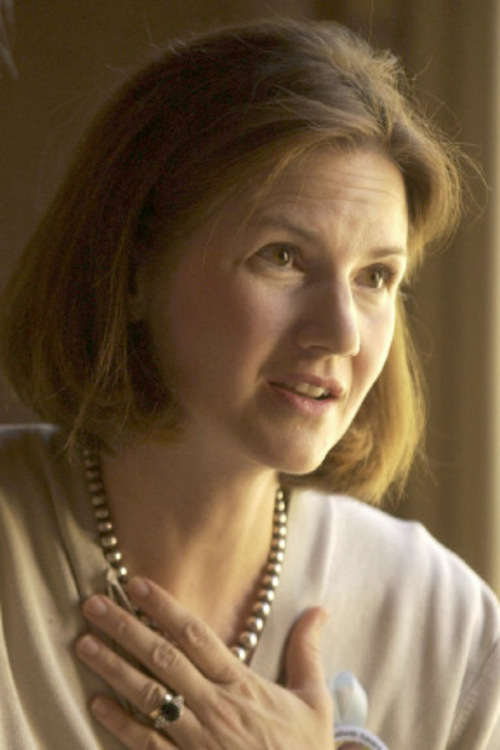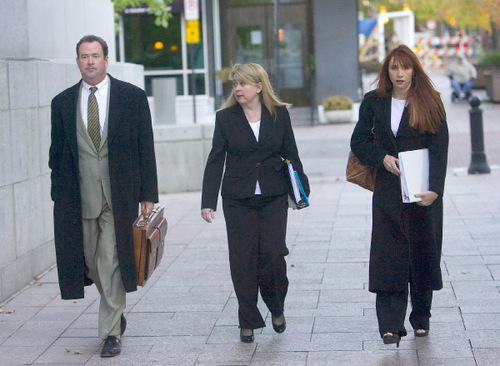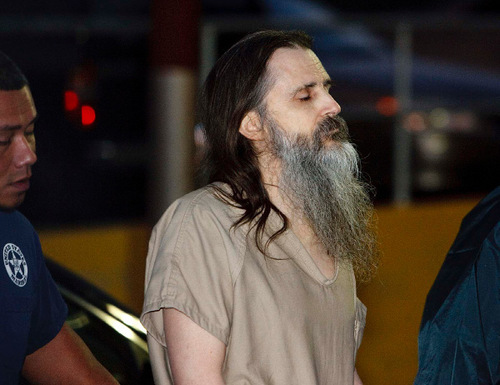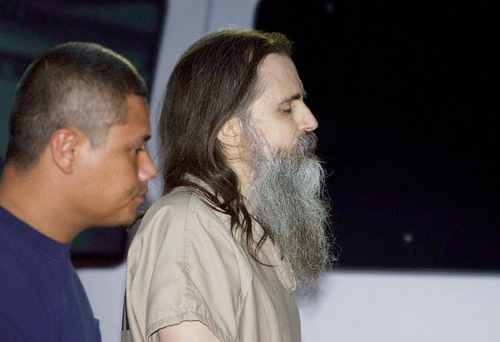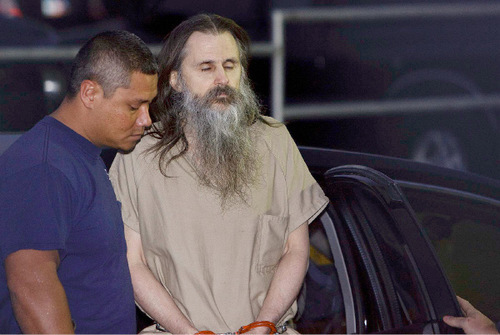This is an archived article that was published on sltrib.com in 2010, and information in the article may be outdated. It is provided only for personal research purposes and may not be reprinted.
The following is a version of the testimony given by Elizabeth Smart on Thursday, Oct. 1, 2009, in federal court in Salt Lake City. Smart testified about her disappearance in 2002 for Brian David Mitchell's competency hearing. She is expected again to testify during his trial, which began with jury selection Nov. 1, 2010.
WARNING: The testimony contains graphic sexual and violent descriptions.
Judge Dale A. Kimball: We're here in the matter of USA vs. Brian David Mitchell.
Judge: [To Brian David Mitchell, who is singing Mormon hymns.] If you continue singing or otherwise disrupting the hearing, you waive that right and will be taken to another room where we have the audio and video feed. Apparently he's not going to stop. I'll ask the Marshals to take Mr. Mitchell to the room prepared for the audio and video feed.
Judge: [To U.S. Attorney for Utah Brett L. Tolman] You may call Ms. Smart.
Tolman: Your honor we would call Elizabeth Smart to the stand.
Judge: Come forward and be sworn in please, Ms. Smart, right up here in front of the clerk of court.
[Smart is sworn in]
Smart: Elizabeth Ann Smart
Tolman: Thank you your honor. Elizabeth, you have water in front of you in case you need it. There are Kleenex, as well. If at any time you need a break let me know. Elizabeth, what happened to you on June 5, 2002?
Smart: A man broke into my house and held me at knife point and kidnapped me.
Tolman: You indicate this is the day you were kidnapped.
Smart: Yes
Tolman: At about what time did this occur?
Smart: In the early morning, between 2 and 3. I was in my house in my room.
Tolman: Where was your sister?
Smart: Right next to me in the same bed.
Tolman: Did you know this individual?
Smart: Yes, Brian David Mitchell.
Tolman: What did he do?
Smart: He came into my room and held a knife to my throat and threatened me with my life and my family's life to come with him.
Tolman: Did he do anything ... ?
Smart: Yes he placed his hand on my chest. He then put the knife up to my neck he told me to get up quietly and if I didn't then he would kill me and my family
Tolman: What was his voice like?
Smart: It was quiet. He was whispering, but it was still loud enough it could wake someone. He was dressed in sweats, a sweatshirt, stocking cap, tennis shoes.
Tolman: Was he carrying anything with him? You indicated a knife. Was there anything else he was carrying?
Smart: Umm. To the best of my memory, that's all I can remember.
Tolman: We'll come back to that. What other instructions did he give you? You indicated he threatened you ...
Smart: He told me to get shoes. When I reached for normal slip-on shoes he told me to take the tennis shoes.
Tolman: He corrected you and indicated you should take tennis shoes ... did you ask why he was taking you?
Smart: Yes, he told me he was taking me hostage and holding me ransom.
Tolman: You learned it was a lie.
Smart: He had [the knife] to my throat and held it to my back as he took me away from my house and took me up into the mountains.
Tolman: Did he continue to threaten you?
Smart: Yes.
Tolman: Once he has you outside the home did you observe if he was carrying anything with him? Did he have a flashlight?
Smart: Yes, he had a flashlight.
Tolman: Did he have any additional clothing?
Smart: I can't remember right now.
Tolman: Any raincoats?
Smart: I just can't remember anymore.
Tolman: Did he have any socks? Did he ask you to put on socks?
Smart: No.
Tolman: What did he say about that?
Smart: I just had my bare feet and my shoes.
Tolman: Did he pick up water along the way? Do you recall if he had placed any water outside?
Smart: I don't remember at all .
Tolman: Was he concerned about getting caught?
Smart: Yes. He forced me to duck down behind some bushes before we crossed the street and we moved at a quick pace up the trail till we eventually turned off the trail and wound up the back side of a canyon where nobody had been. I mean there was no trail.
Tolman: Where did he take you ultimately?
Smart: He took me into a canyon behind my house about three miles up the coast of the mountain ridge. There were lots of trees surrounding where he had a camp he had set up.
Tolman: Was that where Wanda [Barzee, his wife] was?
Smart: Yes.
Tolman: What was the first thing he did to you when he took you to the camp?
Smart: He ... (pause) ... He took me inside, where Wanda then tried to force me to bathe. After arguing with her, she eventually just proceeded to wash my feet and told me to change out of my pajamas into a robe type of garment. And when I refused she said if I didn't she would have Brian Mitchell come rip my pajamas off. I put the robe on in which he came and performed a ceremony which was to marry me to him. After that, he proceeded to rape me.
Tolman: In those early days, what did he do to ensure you didn't escape?
Smart: He had a big bolt with a cable strung between two trees that had a lock with a key. The cable was bolted to my leg, and that was connected to two trees that were connected to both cables.
Tolman: How long was the cable?
Smart: The cable that was on my leg was probably 10 feet long, the one between the two trees was probably 15 to 20 feet long.
Tolman: At any point did you have the key or the ability to take that off?
Smart: No.
Tolman: Did he have it on him?
Smart: Yes.
Tolman: Did he know police were looking for him?
Smart: I turned to him and said, "If you get caught, you'll go to jail." I told him if he would let me go I would speak in his behalf, but he did not.
Tolman: How often did he rape you?
Smart: On a daily basis, up to three or four times.
Tolman: Of your nine months with him, what was his dominant focus?
Smart: Sex.
Tolman: Did he speak to you about religion?
Smart: He used religion to get what he wanted, had an excuse for everything he did with a religious side.
Tolman: Was there ever a time he did not talk about sex or ...
Smart: No.
Tolman: Did he ever give you drugs or alcohol to lower your resistance?
Smart: Yes.
Tolman: Did he ever show you pornography?
Smart: Yes.
Tolman: What would he say to you about why he showed you pornography?
Smart: He would say I have to be humble below all things before rising above all things.
Tolman: Did he use religion to justify behavior?
Smart: Yes.
Tolman: How?
Smart: Anything I showed resistance or hesitance to, he would turn to me and say, "The Lord has commanded you to do this, you have to experience the lowest form of humanity to experience the highest."
Tolman: Did he ever try to convince you that having sex with him was OK?
Smart: He would say that's what a husband and wife do.
Tolman: Was he crude?
Smart: Yes.
Tolman: Was he vulgar?
Smart: Yes.
Tolman: Did he use vulgar terms to describe parts of the male and female body?
Smart: Yes.
Tolman: What would he say he was going to do?
Smart: He was going to minister to the world and to its supplies.
Tolman: What would he want to talk about or do?
Smart: Usually when he'd go down it was after a day or so of not eating, so he would bring back something to eat, then he would go on to rape me.
Tolman: Would he ever sing or shout what he was going to do?
Smart: Yes.
Tolman: What would he say?
Smart: He would run up the mountainside yelling [sexual, violent vulgarities].
Tolman: On several occasions?
Smart: Yes.
Tolman: Did you ever get a break from being raped by the defendant?
Smart: Yes, when Wanda would get very upset with him. She said, 'All you do is lust after her.' In order to calm Wanda down, he would say, I've received a revelation, but there wasn't an actual 24-hour period he wasn't able to rape me.
Tolman: During this so-called break, he was responding to Wanda's objection how lustful he was to you.
Smart: Yes.
Tolman: What would he do to solve that problem?
Smart: He would set apart every other night to have to spend with her, but it wouldn't last very long.
Tolman: He was setting up some sort of schedule, alternating between you and Wanda?
Smart: Yes.
Tolman: Did he adhere to that schedule?
Smart: He did for a little while. There was an occasion when he took me to get water to hike to an underground stream. On the way up he turned to me, he said how much he needed me to have sex with him right then and there, and that Wanda would never know, she would understand and she would be OK, and it would be OK.
Tolman: Did you say no to him?
Smart: Yes.
Tolman: How did it make you feel to say no to him on that occasion?
Smart: Wonderful.
Tolman: Did he try to convince you it would be bad if you stopped?
Smart: One time he tried and I bit him. He said if I did that he would never have sex with me again and I would be the most miserable woman in the world. He said that, but it didn't stop him.
Tolman: Can someone be religous but not spiritual or Christlike?
Smart: Yes.
Tolman: And vice versa.
Smart: Yes. He was religious, but not spiritual, not Christlike.
Tolman: Did you ever observe him to do an act of kindness or charity?
Smart: No.
Tolman: Did he think highly of himself?
Smart: Yes. He was the king. He was the Lord's servant and was doing the Lord's work.
Tolman: Did you observe him use religion to help others or get what he wanted?
Smart: To get what he wanted.
Tolman: How did he do this?
Smart: He used religion to get into the home of the Kemp family. While he was looking for another young girl to kidnap and he went to an LDS ward posing as an investigator and there was a nice couple there that invited them into their home and invited him to dinner. He saw a picture of their daughter. He used religion to get into their home, to pose as an investigator.
Tolman: So to get needs met? Food, water, alcohol, drugs, sex.
Smart: Yes to all.
Tolman: Did you observe him use religion to get all those things?
Smart: Yes.
Tolman: Did he claim to receive revelation?
Smart: Yes.
Tolman: Give blessings to you and Wanda?
Smart: Mainly Wanda, but there were several occasions he gave me a blessing.
Tolman: What was the purpose of the blessings he would give?
[The defense objects]
Tolman: What did you understand the purpose of giving the blessings to be?
Smart: Wanda would get very upset with him and she would just become irate and the only way to calm her down was to turn to her and say that he needed to give her a blessing, and in the blessing he would say what a wonderful daughter of God she was and she was going to be a daughter of Zion and heir to the throne and say what a queen she was.
Tolman: Did it have a calming effect?
Smart: Yes.
Tolman: Did he get what he wanted through the blessings?
Smart: Yes.
Tolman: Did he ever receive revelation to give up drugs, sex, alcohol, porn?
Smart: No.
Tolman: Any religious fast from food, alcohol, sex, water?
Smart: He had a fast from food before. But there also was no food to eat.
Tolman: Ever a word fast, where he would not speak for long periods of time?
Smart: No.
Tolman: Ever feed the hungry, clothe the naked, visit the sick or afflicted?
Smart: No.
Tolman: Were you ever sick during this nine-month period of time?
Smart: There was a time when he gave me too much to drink, which I ended up vomiting all over myself. He let me lie face down in my vomit for the entire night until I woke up the next day.
Tolman: What did he say?
Smart: He said that I was showing my true state, that I was laying face down in my vomit.
Tolman: Did he ever acknowledge what he was doing was wrong?
Smart: No.
Tolman: Did you ever question him on inconsistencies with his values of religion?
Smart: Yes. He said the world was wrong, it was a wicked place, I had been brainwashed by the world and he was the Lord's servant and doing the Lord's will.
Tolman: You were how old?
Smart: 14.
Tolman: Did you observe him to be manipulative?
Smart: Yes.
Tolman: Manipulate Wanda?
Smart: Yes.
Tolman: Manipulate you?
Smart: Yes.
Tolman: Manipulate or try to manipulate others?
Smart: Yes.
Tolman: What would he do to try to manipulate them?
Smart: He would not ... there was one younger man in particular who he worked at Wild Oats.
Tolman: Wild Oats the grocery store?
Smart: Yes, the place that now is Whole Foods. He worked there and he used to just run things across the scanner, so it looked like he was scanning things but he wasn't. He would put them in a bag and give them to Brian David Mitchell.
Tolman: So the individual at the grocer ... he went to him because he could get advantage of him?
Smart: He wouldn't actually scan them, just made it look like he was scanning, so he was stealing from the store. The young man was not — he was on the edgy side, like he had dyed his hair dark and drank, did drugs, went to raves. To the best of my knowledge, that's how he was. Brian never condemned him for doing it, talk about spiritual-related things or religious-related things, talk about God and how God had no respect for a person. I guess this young man felt accepted by Brian. He helped Brian out.
Tolman: Did he turn religion on and off to get what he wanted?
Smart: Yes.
Tolman: You indicated the Kemp family, was that a time when he turned religion on or off? Did he tell you what happened with the Kemps?
Smart: He said that he went to this LDS meeting and that they were just very kind to him, and invited to his home for Sunday dinner.
Tolman: What was he wearing with dinner?
Smart: More casual attire. He had his hair pulled back into a ponytail, had elastic around his beard.
Tolman: Did he wear a religious-type robe?
Smart: No, regular clothes. He said he pretended to be an investigator in the church and that by doing that they invited him into their home, and he saw a picture of a young girl and asked if that was their granddaughter. They laughed and said, 'No, that's my daughter. I'm divorced from first husband. She spends every other weekend and Wednesdays here.'
Tolman: Did he say the purpose of the meeting?
Smart: Yes, he said it was to find a second wife.
Tolman: Did he mention her age?
Smart: Yes, he said she looked about my age.
Tolman: Did he act differently with those who agreed and disagreed?
Smart: Those who agreed, he would say, "God bless you" and say, "Yes" and be agreeable. Those who didn't he would ignore or walk away or start singing, or he would call them to repentance.
Tolman: He would walk away or ignore or sing, but he was different if someone agreed or didn't?
Smart: Yes.
Tolman: The decision was made to leave Utah and go to San Diego.
Smart: Winter was getting closer and the underground house they were digging was nowhere near being finished. He decided we had to move somewhere warmer. That's what the Lord wanted him to do, go find wife number two.
Tolman: Any other reasons?
Smart: As far as I know it was to move away for winter and find wife number two.
Tolman: Was it beginning to get cold in Utah?
Smart: Yes.
Tolman: When in San Diego, was there an incident where he was arrested?
Smart: Yes.
Tolman: What did he say happened?
Smart: We didn't have any food, so he said going to go minister, and um, he said that he went down to the little town we were staying nearby, Lakeside. The first thing he did was, instead of getting or buying a bus fare, he went to a convenience store and bought a beer and walked around Lakeside. A woman who had a cart — the little wire pull-along thing people use — she had some prescription medications on top. He asked for it, she said no. She went into a store, left the cart for a moment, he stole the prescription medicine and took a few pills. I don't know what they were. Then he broke into a church nearby — and I'm not sure what denomination or building it was — broke in, broke a window and he passed out in there because of the alcohol and the drugs, the next morning he was awoken by some police officers. A young woman who worked there had come in, I'm not sure what for. They took him.
Tolman: Arrested him?
Smart: Yes.
Tolman: Did he tell you about being booked into jail?
Smart: Yes, he was sitting cross-legged on the floor. He had some worn-out longjohns, thermal pajamas, under his robe and he had the robe up high. There was a big hole in the crotch of the underwear, right where his private parts were, and he said when they were booking him in, they could see everything and they liked what they saw.
Tolman: Did he indicate he had a lawyer for that episode?
Smart: Yes.
Tolman: What did he say about the lawyer?
Smart: He was a bright young man, and when he went into judge to plead not guilty, the lawyer said he had to plead guilty and pay for the window and do some community service.
Tolman: Did he indicate if he followed the lawyer's advice?
Smart: Yes.
Tolman: Where was Wanda?
Smart: Lakeside. We had set up camp. It was a holiday weekend when he went out and I'm not quite sure — President's Day or MLK Jr. Day — I don't remember which holiday it was. He had to sit in jail for three days before going before the judge. They had to be business days. It was actually six or seven days before he came back to camp.
Tolman: Did he indicate to the judge you three were staying with friends? Was he lying?
Smart: Yes.
Tolman: Did you or Wanda have to explain to him the legal system or charges against him or anything he was confused or uncapable of understanding?
Smart: No.
Tolman: Was he ever confused about things?
Smart: No, he was very smart, knew a lot of things.
Tolman: Was he ever bewildered, confused or out of control?
Smart: No.
Tolman: Did you observe him singing?
Smart: Yes.
Tolman: Did he sing often?
Smart: Yes.
Tolman: Did you observe him to sing to manipulate a situation?
Smart: Yes.
Tolman: Did he turn off or on the singing when he needed to?
Smart: Yes.
Tolman: Did his desire or compulsion to sing ever get in the way of what he wanted?
Smart: No.
Tolman: When he was trying to get sex, food, alcohol, transportation, did he burst into song?
Smart: No.
Defense lawyers: Objection, she didn't hear him.
Tolman: Did you observe him attempt to get sex, food, drug, transportation?
Smart: Yes.
Tolman: Did he ever sing so it prevented to get those things?
Smart: No. There was a time at the Salt Lake City library a person approached him and asked that I remove the veil and cover that they had me wear always. He said I couldn't, it was part of our religion and there was no possible way I could do that.
Tolman: Did he ever burst into singing when confronted by law enforcement?
Smart: No.
Tolman: Did you have to intervene because he was not in control or had burst out into singing or some concept he did not understand?
Smart: No.
Tolman: Did you ever get sense that he enjoyed or got a kick out of fooling others?
Smart: Yes. He would be laughing and say, "They think they're so smart," or, "They think they're guiding me to the light and they don't know I'm the king. I know this. I can dance steps around them. They don't know who they're dealing with."
Tolman: Did he brag about how much he knew about different topics or subjects?
Smart: Yes. He talked about anything that ever came up. He had to be right. He had to know about it. He had to be the authority on that topic.
Tolman: Things religious or not religious?
Smart: Yes.
Tolman: Any topic?
Smart: Yes.
Tolman: Is it fair to say in that nine-month period of time you came across a number of individuals?
Smart: Yes.
Tolman: Considering all these people, did anyone ever suggest that the defendant needed professional help?
Smart: No.
Tolman: That you should get him to a hospital or help?
Smart: No.
Tolman: Did you conclude he was intelligent?
Smart: Yes. He knew a lot about a lot of different things. He told me about his craziest life, about what he did, what he had done. He was very capable, intelligent human being.
Tolman: Was he articulate?
Smart: Yes.
Tolman: Was the defendant honest?
Smart: No.
Tolman: Do you believe he was honest?
Smart: No.
Tolman: Did you observe him lie?
Smart: Yes.
Tolman: Did it come easy?
Smart: It was easy.
Tolman: Was he convincing?
Smart: To many people, I think so.
Tolman: Were you convinced?
Smart: No.
Tolman: Others were convinced by him?
Smart: Yes.
Tolman: You indicated he was determined not to get caught. How determined?
Smart: He said he would kill anyone who came into the camp or kill me if I tried to escape or yell out or do anything not in coordinance with what he wanted. He told me to say that we were traveling and that he was my father and that Wanda was my mother.
Tolman: Did he tell you to refer to them as mother and father in that instance?
Smart: Yes. He told me to say I had been home schooled and that we traveled around ministering to different people.
Tolman: Did he have a name for you?
Smart: Yes, Augustine Marshall.
Tolman: He told you to use that name?
Smart: Yes.
Tolman: Do you know how he came up with that name?
Smart: It was after the month August.
Tolman: Did he have a name for Wanda?
Smart: Yes.
Tolman: What was her name?
Smart: Juliette.
Tolman: What was the meaning behind her name?
Smart: It was after the month of July.
Tolman: Did he have names for himself?
Smart: Yes, there was his name Immanuel David, prophet Isaiah and then David Sherlson ... David was his middle name and his father was Sherl, so Sherl's son. When he was booked into San Diego he used a different name.
Tolman: Did he tell you that name?
Smart: Michael Jensen.
Tolman: Did he ever quiz you on what you were to say?
Smart: Yes.
Tolman: Did he ever introduce you to others as his bride?
Smart: No.
Tolman: Did he publicly acknowledge you were his bride?
Smart: No.
Tolman: Did he ever say he was commanded to marry several individuals? Did he tell anyone else?
Smart: No.
Tolman: Did he tell anyone else he was to plunder girls and use them as brides?
Smart: No.
Tolman: Did he tell you and Wanda that?
Smart: Yes.
Tolman: Did you observe him talk his way out of situations with law enforcement?
Smart: Yes.
Tolman: How was he in an argument?
Smart: Forceful.
Tolman: Was he quick on his feet?
Smart: Yes.
Tolman: Could he adapt to his surroundings?
Smart: Yes.
Tolman: Did you observe him adapt to the people he was with or the circumstance he was in?
Smart: Yes.
Tolman: Did he indicate he had studied psychology, mind control and hypnosis?
Smart: Yes. He spoke about how people thought and he talked about a time in his life when he was in southern Utah. He was with his brother and he had some books that he had been reading that were on hypnosis and witchcraft, I think.
Tolman: Did he ever tell you about getting away with things in his past?
Smart: Yes. He talked about how in high school he was one of the graduating seniors and there was a girl who was younger and she was physically mature for her age, and he came up behind her and stuck his hand down her shirt and walked away and nothing ever happened. And he talked about his two previous marriages and how he had been accused with molesting his second wife's youngest daughter and how nothing ever happened, how he was able to walk away from that.
Tolman: Did he ever talk about being able to walk away from financial debt or other obligations?
Smart: Yes, and he talked about how he had walked away from an apartment lease and from a big fifth-wheel trailer they took up to Idaho. They stopped making payments and just left it on some property and walked away from it. He talked about how the LDS Church had called an excommunication hearing and how he just never showed up to it and so he walked away from that, and he talked about how his mother had gotten a restraining order put on him and he didn't care, he just walked away from that.
Tolman: Elizabeth, are you aware he was writing a book, the book of Immanuel David Isaiah?
Smart: Yes.
Tolman: Are you aware he wrote in this book after he was captured?
Smart: Yes.
Tolman: Did he try to convince you that you held the key?
Smart: No
Tolman: Did he try to convince you he could have gotten away?
Smart: No.
Tolman: Did he try to convince you that your parents invited him to their home that night?
Smart: No.
Tolman: That they removed the lock from door and turned off the security alarm?
Smart: No.
Tolman: Did he tell you or Wanda, or convince you, you had opened the window for him to get into the house?
Smart: No.
Tolman: Did he try to convince you you had heard the lord's command of wanting to go with him, that's why you did?
Smart: No.
Tolman: Would he have been able to convince you that any of these claims were true?
Smart: No.
Tolman: This was at all times against your will?
Smart: Yes.
Tolman: Did he acknowledge what he was doing was against the law?
Smart: Yes.
Tolman: Did he have knowledge of the legal system?
Smart: Yes.
Tolman: Did he have knowledge of the government?
Smart: Yes.
Tolman: Did he have knowledge of what would happen to you if he was caught?
Smart: Yes.
Tolman: What words would you use to describe Brian David Mitchell?
Smart: Evil, wicked, manipulative, sneaky, slimy, selfish, greedy, not spiritual, not religious, not close to God.
[Cross examination by Assistant Federal Defendant Robert L. Steele begins.]
Steele: You talked about a concern about getting caught that first night outside of your house. Talk about that. You said he pulled you down behind a bush. Why?
Smart: There was a passing cop car, and he didn't want to be caught.
Steele: What did he say after the cop car passed?
Smart: To the best of my memory, 'The Lord is with us.'
...
Steele: He performed a marriage ceremony that night. Was it lengthy or short?
Smart: Short.
Steele: What did he say?
Smart: He just said that in the power that was vested in him, I would be bound on heaven as is on Earth to be wife. I screamed, 'No.' That didn't have any effect on him. He said if I was going to scream, he would kill me.
Steele: I'm sure that was shocking, the marriage ceremony. I bet you didn't see that coming at all. He spent a lot of time talking, he spent a lot of time speaking?
Smart: Yes.
Steele: When?
Smart: Throughout the day.
Steele: What kinds of things did he talk about?
Smart: He talked about a lot of things. He talked about his past experiences, he talked about his previous marriages, talked about me [inaudible] Wanda, talked about the first time he saw me, the future, talked about how we would all appear when he came out of hiding so to speak, talked about the different jobs and occupations he had held, he talked about a lot of things.
Steele: You know an awful lot about Mr. Mitchell and Wanda Barzee.
Smart: Yes.
Steele: They told you their whole life story. Their marriages — they had several — their children's names.
Smart: Yes.
Steele: He told you good stuff about himself and bad stuff about himself?
Smart: Yes.
Steele: What did he tell you about the government?
Smart: The government was corrupt and served the devil and was of the world, and that America had fallen from being a God-fearing country and they were no longer.
Steele: What did he tell you about the LDS Church?
Smart: He said that the LDS Church will be punished more than anyone because they have the most light and truth and have the knowledge, and are not willing to live it. That when the time had come that many of them would have the strength to break away and follow him.
Steele: What did he think he was? What did he tell you?
Smart: He told me that he was a prophet. He was the Davidic king. He said he was God's voice on the Earth and he would reign over the children of God until Christ came, continue to be Christ's mouthpiece for the world.
Steele: Did he talk about the Antichrist?
Smart: Yes.
Steele: What was his position with the Antichrist?
Smart: He said he would one day fight the Antichrist.
Steele: What was the outcome of all that?
Smart: He would be the one to kill the Antichrist.
Steele: He read you the book of Immanuel David Isaiah?
Smart: Yes.
Steele: He read it. How many times?
Smart: Yes, I don't know if I could put a number on it.
Steele: Did you pray together every day, sing?
Smart: Yes.
Steele: What kinds of things?
Smart: Wanda had compiled a book of religious songs, the songs he had compiled.
Steele: How much time of the day?
Smart: Depends on the day. Sometimes just one or two songs, sometimes no singing, sometimes if he was working he would sing, or if uh, he just — there was usually a reason. It wasn't just because he couldn't contain himself. He felt like singing. He wanted to sing.
Steele: You sang with him?
Smart: It wasn't a duet, so to say. We all sang together before we prayed.
Steele: Did he have trouble sleeping at night? Did he get up?
Smart: Yes.
Steele: Were you all sleeping in the same spot?
Smart: Yes.
Steele: How many times in the night would he get up?
Smart: I don't know. I was sleeping by myself.
Steele: Any guess? Once a night? More?
Smart: Maybe once or twice. I think it was just to go to the bathroom.
Steele: Could it be as much as six or seven times?
Smart: Umm ... I don't know. I don't remember, but I think it was once or twice to the best of my knowledge. I couldn't tell you anymore.
Steele: When you say, "I was recovered," "I was found," "He was captured," what's the phrase you use?
Smart: I came home.
Steele: A couple days after you came home you were interviewed.
Smart: Yes. I don't know how long it lasted.
Steele: And you told the doctors a great many things.
Smart: Yes.
Steele: This was a long time ago, 2003. If you had said at that time he got up six to seven times per night you would have been telling the truth.
Smart: Yes.
Steele: He got up and exercised. Is that something you remember?
Smart: Now that you bring it up, I vaguely remember something like that. It wasn't like running or lifting weights or exercising as we think of it. It involved deep breathing, umm, like squatting, standing and squatting. Hopping could have been a part of it.
Steele: That's all you remember.
Smart: Yeah.
Steele: You gave a whole list of things ... I didn't hear you say ... [inaudible]
Smart: A hypocrite is someone who preaches one thing, like preaches not to smoke and then turns around and smokes.
Smart: He said carnal man was inside us. There was a part of all of us that was carnal.
Steele: He acknowledges he had trouble with that.
Smart: Yes.
Steele: It was clear he had trouble with that to you.
Smart: Yes.
Steele: He used the word — I believe it was San Diego, the start of the Kemp story — that he presented himself as an investigator. Tell us what that term means.
Smart: An investigator in the LDS Church is someone who is interested in learning more. That they're investigating the beliefs of the LDS doctrine.
Steele: How often did you eat during the day?
Smart: Usually it was once, but there were periods of time when sometimes there would be more. It was generally when we ate. It was when there was food. It was when he was in prison or in jail in San Diego, for that period of a week there was nothing to eat. We collected rainwater and drank rainwater for a few days.
Steele: In San Diego, you describe him getting dressed in a specific way to go back to the Kemp's house.
Smart: Yes.
Steele: Did he tell you what happened when he went there? Oh, I'm sorry, two different ways: one where he dressed as normally as he could and the other in which he dressed not in a tunic but in dark regular clothes. Tell me what happened when he went back second time.
Smart: He said he went back and looked for a way to get in. There was a window or sliding door and he started to open it and heard loud snoring inside. I think he said it was an older brother or male figure in the room and that scared him, so he left.
Steele: Did he tell you something before he left, like, "She's the one?"
Smart: Yes, it meant he was going to do the same thing to her he did to me.
Steele: How did you feel about that?
Smart: Heartbroken.
Steele: When he came back did he say, "She's not the one."
Smart: He said the Lord was testing his faith.
Steele: What would he have meant?
Smart: That the Lord was just testing him and it was all in preparation for the next young woman.
Steele: So was it your impression that he initially thought she was the one, but the Lord threw up enough obstacles that it meant she wasn't?
Smart: Well it was just like a preparation, like a step, like just another step to umm, becoming more prepared to come ... just to show that ... umm ... he wasn't ready to get to kidnap the next young girl.
Steele: Did he come back and say, "I failed?"
Smart: I don't remember.
Steele: Or was it your impression that he said, "The Lord didn't want me to accomplish this?"
Smart: It was more like "The Lord didn't want me to accomplish this." I mean he wasn't like distraught about it or anything.
Steele: His arrest, there, you umm, talk about, he told you that he got beer, he got some prescription meds and got pretty high. What was the weather like that day?
Smart: Umm, well I don't remember it being rainy. I don't remember it.
Steele: Didn't he tell you that his clothes got wet?
Smart: I don't remember. I just don't remember the weather. I mean he could've.
Steele: There's a pretty interesting thing that happened when he got into the church. He got separated from his clothing. What did he tell you happened?
Smart: I think he wet his robes, so he took them off and there was the hole right in the crotch area, so I don't think that the thermal underwear got wet, but it wouldn't be unnatural for him to just ... I mean like he had control of his bladder, but there had been times when he just decided to go.
Steele: Did he tell you the clothes ended up in a room that was locked and he couldn't get back into that room?
Smart: I don't remember that.
Steele: Did he talk to you about two other women he'd approached prior to you?
Smart: Yes.
Steele: Do you remember what he said about Kelly and/or Julie?
Smart: I remember he talked about Kelly, that she was an African-American and that she was a special daughter of Job but that she wasn't like ... she wasn't practicing monogamy and that he talked to her and I think he said he lived with her for a little while. I don't exactly remember because it's been so long. He talked about one time she came in and she had been with another man and he was very, very upset with her, very mad at her, and there had been one last time he had gone to see her to invite her to their teepee they had hidden up the canyon and to spend the weekend up there, and she said no, I believe.
Steele: He was hoping she would become a plural wife?
Smart: Yes.
Steele: How old was she?
Smart: She was in her 30s, not a teenager, not a young girl.
Steele: Julie? What about Julie?
Smart: They had met in a shoe store, I believe it was, and that she was engaged to some fellow but that she had run away from being part of a polygamous family and knew a lot about polygamy and how their lifestyle is, and that he had decided she was going to be one of his wives, and that when he went back she was no longer working there.
Steele: Going back to San Diego, even before that. Had he had use the word plunder in regards to wives and food and such things?
Smart: Yes.
Steele: Did he say he couldn't do that anymore, go shoplifting in San Diego?
Smart: Yes.
Steele: How did he come to that? Did he say I don't believe it's right to plunder? Did he say this is too stressful, I can't do it?
Smart: I've just completely forgotten it. I think he said it was too dangerous. I don't think about it every day. I don't remember.
Steele: Whose idea was it to come back to Salt Lake City?
Smart: It wasn't completely him, it was actually mainly me. California was so far away and so cut off that no one would ever find me. Even if it took 20 years to find me, I felt the chances would be better in Salt Lake City, so I just asked him about it. He had used religion to justify pretty much anything he wanted to, so I decided to use his tactic. So I said I had a very strong feeling about going to Salt Lake, and I asked what God was telling you. He told me how he hitchhiked all over the place, I had to sink below all things to rise above all things, shouldn't I experience that, too? So that's how he decided to go back to Salt Lake.
Steele: In religious terms, why did you go back to Salt Lake? What might happen to him?
Smart: He had great power and glory, people who didn't believe us, there would be a mob to come stone us, lay in the streets, be dead, rise up and be untouchable. He would come back to Salt Lake and fight the Antichrist. That's when he would fight the Antichrist.
Steele: Did he tell you who the Antichrist might be?
Smart: He would be a deceased president. [Then LDS Church President Gordon B.] Hinckley was a type of Antichrist, not the actual Antichrist, the one that he would fight.
Steele: The time you all were approached by a detective, talk about that. What were you at the library doing?
Smart: Looking at maps for an area of San Diego and California.
Steele: So you found maps. You said that he told you that he would kill you if you try to leave?
Smart: He said an angel would strike me down with a sword; he would be that angel.
Steele: He had that knife.
Smart: Yes.
Steele: You put those things together?
Smart: I saw it on different occasions, not every day. I saw it with him. He used it.
Steele: Did he ever tell you he didn't have to hurt anyone?
Smart: He was relieved, but if the time came that he had to ...
Steele: Did he use the aka Peter Marshall? Did he tell you who Peter Marshall was?
Smart: Not related to anyone but himself.
Steele: He told you that walking away from death, he and Wanda told you about their travels? How long had they been traveling, what had they been doing while traveling?
Smart: Wait, walking away from death?
Steele: Yes, I asked that very poorly. What were they doing with their lives before he came and took you?
Smart: they had gone all over the country and he said that they were just trying to do what God had wanted them to do.
Steele: What ... how long had they been doing that?
Smart: It had been for periods of time when they stayed with his mother, her mother and some other people as well, they had been, every few years, able to leech onto his mother or her mother or other family whose policy was ''I wouldn't turn anyone away and stay with me,'' other people's generosity. They had been hitchhiking and traveling around for a few years.
Steele: They pushed a handcart some distance?
Smart: Yes.
Steele: Is 10 years a good guess?
Smart: Yes, without going to his mother or her father. They stayed with Dr. West.
Steele: Who was Dr. West?
Smart: I never stayed with him but he wrote a book on natural healing. He was the one who said, ''As long as I have a house or food, I'm not going to turn someone away.''
Steele: Did Brian talk to you about lymphology?
Smart: Yes.
Steele: Did he talk about his association with Dr. West?
Smart: Yes.
Steele: What did he say?
Smart: He just said it was true, and pharmaceutical companies knew it was true but they would be turning away millions of dollars, so they weren't going to acknowledge it was true. Like when he exercised. It was the deep breathing, hot expansion-cold contraction, rubbing something, like eating pure foods.
Steele: So the exercising at night that didn't look like normal exercise, that might have been lymphology?
Smart: Yes.
Steele: He told you that was when he got revelation?
Smart: I don't recall the exact time anymore, but probably, yes. He got them sporadically. I don't think it had a connection with him doing a certain something. If he wanted something, that's when he got a revelation.
Steele: You didn't trust his revelations?
Smart: No.
Steele [to the judge]: If I might have a moment your honor?
Judge Kimball: You might.
Steele [to Smart]: What are the seven diamonds plus one, do you remember that?
Smart: Yes, it was the different books he believed in. I'm not sure I can name them all still, but it was the [Book of Mormon], the Bible - the Kings James version of the Bible - the book Dr. West wrote, the Doctrine and Covenants, Pearl of Great Price, the book of Isaiah. There was a translation he had that he always read out of. There was a book the final (inaudible) ...
Steele: So those are the books he read from?
Smart: Yes.
Steele: I have no further questions.
[The redirect begins again with U.S. Attorney for Utah Brett L. Tolman.]
Tolman: Was religious language part of his everyday speech?
Smart: Sometimes.
Tolman: Was he able to turn it off and on?
Smart: Yes.
Tolman: What about in front of Wanda? Did he use religious language or speech in front of Wanda?
Smart: Yes.
Tolman: There are some religious terms defense counsel has brought up that may seem unusual to those outside of the LDS culture. What is your religion, Elizabeth?
Smart: I am LDS.
Tolman: Inside is it common to hear terms like revelation, blessings, missions, believing in more religious books than just the Bible?
Smart: Yes.
Tolman: These were not necessarily foreign terms to you or unusual.
Smart: No.
Tolman: In fact you??re preparing to go on a mission yourself?
Smart: Yes.
Tolman: Was Wanda there during the ceremony?
Smart: She was outside the door.
Tolman: What do you believe was the importance of the marriage ceremony?
Smart: I think it was to placate Wanda and to ... it was to make it so it looked like - so it gave the appearance he was doing what the Lord had told him to do.
Tolman: Was it to get something he wanted: drugs, sex, alcohol?
Smart: Yes.
Tolman: Notwithstanding he used religious language and the interactions with he and Wanda, was it a constant focus to not get caught?
Judge Kimball: It is leading. Rephrase.
Tolman: How much focus was on not getting caught?
Smart: He said he would kill anyone who came into the camp and kill me if I tried to leave. He forced me to wear a veil ... my entire head was covered.
Tolman: Defense counsel brought up the West family. Did you learn the personal policy not to turn away. Did the defendant tell you about that?
Smart: Yes.
Tolman: Did he tell you he took advantage of that policy?
Smart: Well he didn't just flat out say, ''I took advantage of him,'' but he knew they wanted him to leave and he didn't and he continued to stay there for awhile.
Tolman: Was the defendant a hypocrite?
Smart: Yes.
[The re-cross examination begins with Assistant Federal Defender Robert L. Steele.]
Steele: You came down into Salt Lake City from the mountains a couple of times?
Smart: Yes.
Steele: Once you were all at a party?
Smart: Yes.
Steele: And he got run off after getting in a religious argument?
Smart: Yes, he was also drunk and high ...
Steele: You spent time in a couple restaurants and the library?
Smart: Yes.
Steele: Stayed overnight with a couple people?
Smart: Yes.
Steele: How often were you walking the streets of Salt Lake City?
Smart: Not often.
[The testimony concludes.]





